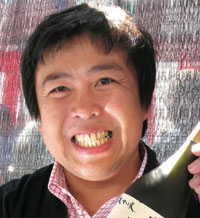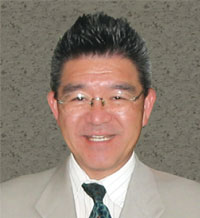Their first store in the U.S. ----The Japanese home cooking style set menu restaurant chain
By Elli Sekine
“Yayoiken”, a set menu chain that has over 300 stores all over Japan finally came to the United States this spring. Their English name is “YAYOI”, and the first store is in Palo Alto, Silicon Valley. On the way there, my curiosity grew. I was wondering what kind of challenge this Japanese style family restaurant was facing, and how they were received in America, which is the restaurant industry powerhouse. This restaurant is located in Downtown on University Avenue. Its elegant façade stands out, and inside is bright, casual, and practical looking. They have a pretty innovative ordering system. An iPad is installed at each table through which orders are placed. The rich menu that contains both Japanese and Western dishes is very well accepted for the good quality and the pricing. The high-quality Japanese restaurant chain, Yayoiken, has started its smooth sailing in America.
In Japan, there is a saying, “IchijuSansai” (one soup, three side dishes), which is the traditional ideal of a well-balanced eating habit. Generally, it means a meal with rice as a main food with 2 side dishes and a bowl of miso soup. For a long time, since the Meiji Restoration, “Western style meals” transported from the foreign countries have been rearranged, evolved, and settled into home cooking and the restaurant industry in Japan. For instance, karaage, croquet, curry, etc, are now recognized as a part of Japanese cuisine overseas. Until some decades ago, the image of a set meal restaurant was a small eatery, but nowadays, it is more like one of the stores of nation-wide restaurant chains that is a rapidly growing business in Japan. This fast-growing industry is even expanding to overseas.
Plenus Co. Ltd,. the headquarters of “Yayoiken”, was originated from a bento chain which held sway over the minds of the people in the seventies called “Hokkahokka-tei”. They are now separated from the original maker, and run as a different company. From 2008, they started a bento chain called HottoMotto, and grew to be a mammoth chain that holds 2,600 stores nationwide. “Yayoiken” is their restaurant department in the affiliated company, and is the fastest growing chain in the restaurant industry,
There are already a total of over 130 “Yayoiken” in Asia and Australia. Following the Palo Alto store, the second one in the U.S. opened in Cupertino. You may think that the American customers might be confused about the unfamiliar term, “set menu”. However, the reality is that there is no such thing. The local resident chief manager, Mr. Teramoto, says that the customer can order whatever they like with no problem. Without a doubt, the reason is the big menu book with descriptions and large full-color photos of all the dishes. It is so easy to see what you want. In addition, the innovative iPad ordering system reduces the number of servers, and provides speedy service to deliver orders to customers’ table quickly without making them wait for a long time. Transparent billing with pre-included tips can also contribute to better rotations.
The history of set meals, special brand rice, etc. are explained on the menu, and help customers become familiarized with Japanese culture. Some of the popular dishes from over 30 set meal choices are “Yayoi Gozen”, a gorgeous set with pork cutlet salmon and sukiyaki ($24), “Nanban Teishoku” ($15), and “Hitsumabushi” (BBQ eel over rice served with a side of dashi broth, Nagoya style) which is a rare dish in the States. The wide variety of Japanese and Western dishes on the menu can cover every group and its diversified eating habits. There are also plenty of drink choices with over 20 different sake and draft beer brands.
“Yayoi” is particular about rice, dashi, and sauce, which are the base of Japanese cuisine. Those base ingredients are imported from Japan to all of the overseas stores. Kinmemai rice is polished in-house to make sure of the freshness. The rice for the stores is also cooked with soft water filtered in a huge water filtering system because it is believed that rice grown in soft water tastes better if cooked also in soft water. The rice looks like regular polished white rice, but it is polished in a particular way so aleurone layer (that includes carbohydrates which produce sweetness and umami) and a portion of embryo buds will remain on the rice to keep brown rice–like characteristics for a fluffy and shiny cooked product. In the Bay Area where people are very health conscious and think brown rice is healthier, this delicious and highly nutritious rice might revolutionize such thinking. The dashi and sauce, which are the core of “unchangeable deliciousness”, are pre-measured accurately and shipped swiftly from the central kitchen in Japan to keep the same taste worldwide.
Each overseas store has a resident store manager and a head chef from Japan to lead the staff. To manage the operations, each Japanese head chef candidate is intensely trained for 3 months overseas before the assignment, and the rest of the staff members are locally hired.
Among the ever-growing IT ventures in Silicon Valley, “Bento box” is getting very popular for lunch. There are not nearly enough Japanese food catering businesses to accommodate the needs. If a mammoth bento chain, “HottoMotto” comes to America following “Yayoi”, more opportunity may arise. The challenge of Plenus Co. Ltd to the restaurant industry in the U.S. seems to have just begun.
米国初進出ーー日本の家庭の味を伝承する定食屋
日本全国に300店舗を構える定食チェーンの「弥生軒」がついにこの春、米国進出を果たした。その記念すべき英語名、「YAYOI」の第1号店がシリコンバレー、パラアルト店だ。 ファミリー外食産業大国のアメリカで、日本の“ファミレス”がどのようにチャレンジし受け入れられているのか興味津々で店に向かった。ダウンタウンのUniversity Avenue に位置する同店はひときわ目立つ上品な構えだが、中はカジュアルで機能的なレイアウト。 各テーブルごとにiPadが設置され、オーダーは全てコンピュータで行うという画期的なシステムだ。和洋が織りなす豊富なメニューは良質で低価格と評判が良い。日本の優良外食チェーン店「弥生軒」は米国でも順風満々なスタートを切っていた。
日本の家庭料理といえば、昔から『一汁三菜』というバランスを考えた食事習慣がある。米を主食にしたおかず2品、味噌汁というのが一般的だ。明治維新以来、外国から伝わった「洋食」は日本風にアレンジされ進化し、長年一般の家庭料理、外食産業に定着している。その例として唐揚げやトンカツ、コロッケ、カレーなど今では海外でも日本食の一部として知られている。一昔前まで定食屋といえば小さな「食堂」というイメージが濃かったが、最近日本では全国展開のチェーン店が急増している。そしてその勢いは海外にも広がっている。
「弥生軒」の本部、プレナス社 は、もともと70年代に一世風靡をした弁当チエーン、「ほっかほっか亭」がルーツである。現在はこのメーカーとは別経営となり、2008年より「ほっともっと」弁当チェーンとして、現在全国に2600店舗のマンモスチェーンに成長した。そして同系列のレストラン部門が、「弥生軒」。その成長スピードは外食業界でトップだ。
「弥生軒」は、海外ではすでにアジア、オーストラリアに130店舗以上展開しており、米国は同店に続き2号店が11月にクパチーノにオープンした。「定食」というまだアメリカでは聞きなれない和食スタイルに客が戸惑うのではと思いきや、現地常駐のチーフマネージャー、寺本氏は、全く問題なく皆好きなものを注文するのだと答えてくれた。それもそのはず、大きなフルカラーのメニューブックには、一つ一つのおかずが大きな写真付きで説明してあり、一目見ただけで好みを見分けられるようだ。また、iPad の改革的なオーダーシステムは、従業員の人数が省けるだけでなく、お客を待たすことなくスピーディーに注文の品が運ばれ、チップを含んだ明朗会計が回転率を良くしている。
メニューには定食の歴史や特別品種米の説明がしてあり、日本の食文化を身近に感じられる。30種以上の定食から人気は、トンカツ、サーモン、すき焼きの豪華セットになった豪華版、「弥生御膳」($24)、チキン南蛮($15)や、米国では珍しいひつまぶしなど。和洋食のバラエティなメニューなあらゆるグループ、食習慣の多様性に対応している。またお酒の種類も多く、樽生ビールなども合わせ20種類を超える。
「YAYOI」の特徴は、日本食の基本となるお米と出汁、ソースのこだわりにある。海外店舗にはこれらの食材は全て日本から輸入し、米は日本産の金芽米を自社精米し鮮度を大切にする。さらに「軟水で育ったお米は軟水で炊いたほうが美味しい」という理由で、巨大なフィルター機器で軟水に変換した水で米を炊いている。一件白米に見えるが、「糊粉層」と「胚芽」の一部を特殊な精米技術で残し“玄米のような性質を残しふっくらツヤツヤに仕上げる。健康志向が高いベイエリアで、米といえば「玄米」という意識も、この美味しく栄養価が高い米が変革を起こしそうだ。また、「変わらない美味しさ」の要となる出汁とソースは、全て日本の中央キッチンで分量など正確に調合されたものを国内外に素早く発送し同じ味を保っている。
海外の各店舗にはリーダーシップを担う店長、料理長が駐在している。料理長候補は3ヶ月みっちり海外でトレーニングを受けた日本人が配属され、他の従業員はそれぞれの国、都市で現地採用をし、管理体制を整えている。
発展し続けるシリコンバレーのIT企業では、「お弁当」が従業員の昼食として人気を集めている。同時に日本食ケータリングは需要に追いつかないほどの勢いだ。この先、「Yayoi」に続きマンモス弁当チェーン「ほっともっと」が米国進出すれば、さらなる可能性が広がるのではないだろうか。「プレナス社」の米国外食産業へのチャレンジはまだ始まったばかりだ。
YAYOI
403 University Ave
Palo Alto, CA 94301
(650) 494-4437
http://www.yayoi-us.com
Lunch Mon-Fir 11:00 am - 2:00 pm
Sat -Sun 11:00 am -3:00 pm
Dinner Mon-Sun 5:00 pm - 9:00 pm
“Yayoiken”, a set menu chain that has over 300 stores all over Japan finally came to the United States this spring. Their English name is “YAYOI”, and the first store is in Palo Alto, Silicon Valley. On the way there, my curiosity grew. I was wondering what kind of challenge this Japanese style family restaurant was facing, and how they were received in America, which is the restaurant industry powerhouse. This restaurant is located in Downtown on University Avenue. Its elegant façade stands out, and inside is bright, casual, and practical looking. They have a pretty innovative ordering system. An iPad is installed at each table through which orders are placed. The rich menu that contains both Japanese and Western dishes is very well accepted for the good quality and the pricing. The high-quality Japanese restaurant chain, Yayoiken, has started its smooth sailing in America.
In Japan, there is a saying, “IchijuSansai” (one soup, three side dishes), which is the traditional ideal of a well-balanced eating habit. Generally, it means a meal with rice as a main food with 2 side dishes and a bowl of miso soup. For a long time, since the Meiji Restoration, “Western style meals” transported from the foreign countries have been rearranged, evolved, and settled into home cooking and the restaurant industry in Japan. For instance, karaage, croquet, curry, etc, are now recognized as a part of Japanese cuisine overseas. Until some decades ago, the image of a set meal restaurant was a small eatery, but nowadays, it is more like one of the stores of nation-wide restaurant chains that is a rapidly growing business in Japan. This fast-growing industry is even expanding to overseas.
Plenus Co. Ltd,. the headquarters of “Yayoiken”, was originated from a bento chain which held sway over the minds of the people in the seventies called “Hokkahokka-tei”. They are now separated from the original maker, and run as a different company. From 2008, they started a bento chain called HottoMotto, and grew to be a mammoth chain that holds 2,600 stores nationwide. “Yayoiken” is their restaurant department in the affiliated company, and is the fastest growing chain in the restaurant industry,
There are already a total of over 130 “Yayoiken” in Asia and Australia. Following the Palo Alto store, the second one in the U.S. opened in Cupertino. You may think that the American customers might be confused about the unfamiliar term, “set menu”. However, the reality is that there is no such thing. The local resident chief manager, Mr. Teramoto, says that the customer can order whatever they like with no problem. Without a doubt, the reason is the big menu book with descriptions and large full-color photos of all the dishes. It is so easy to see what you want. In addition, the innovative iPad ordering system reduces the number of servers, and provides speedy service to deliver orders to customers’ table quickly without making them wait for a long time. Transparent billing with pre-included tips can also contribute to better rotations.
The history of set meals, special brand rice, etc. are explained on the menu, and help customers become familiarized with Japanese culture. Some of the popular dishes from over 30 set meal choices are “Yayoi Gozen”, a gorgeous set with pork cutlet salmon and sukiyaki ($24), “Nanban Teishoku” ($15), and “Hitsumabushi” (BBQ eel over rice served with a side of dashi broth, Nagoya style) which is a rare dish in the States. The wide variety of Japanese and Western dishes on the menu can cover every group and its diversified eating habits. There are also plenty of drink choices with over 20 different sake and draft beer brands.
“Yayoi” is particular about rice, dashi, and sauce, which are the base of Japanese cuisine. Those base ingredients are imported from Japan to all of the overseas stores. Kinmemai rice is polished in-house to make sure of the freshness. The rice for the stores is also cooked with soft water filtered in a huge water filtering system because it is believed that rice grown in soft water tastes better if cooked also in soft water. The rice looks like regular polished white rice, but it is polished in a particular way so aleurone layer (that includes carbohydrates which produce sweetness and umami) and a portion of embryo buds will remain on the rice to keep brown rice–like characteristics for a fluffy and shiny cooked product. In the Bay Area where people are very health conscious and think brown rice is healthier, this delicious and highly nutritious rice might revolutionize such thinking. The dashi and sauce, which are the core of “unchangeable deliciousness”, are pre-measured accurately and shipped swiftly from the central kitchen in Japan to keep the same taste worldwide.
Each overseas store has a resident store manager and a head chef from Japan to lead the staff. To manage the operations, each Japanese head chef candidate is intensely trained for 3 months overseas before the assignment, and the rest of the staff members are locally hired.
Among the ever-growing IT ventures in Silicon Valley, “Bento box” is getting very popular for lunch. There are not nearly enough Japanese food catering businesses to accommodate the needs. If a mammoth bento chain, “HottoMotto” comes to America following “Yayoi”, more opportunity may arise. The challenge of Plenus Co. Ltd to the restaurant industry in the U.S. seems to have just begun.
米国初進出ーー日本の家庭の味を伝承する定食屋
日本全国に300店舗を構える定食チェーンの「弥生軒」がついにこの春、米国進出を果たした。その記念すべき英語名、「YAYOI」の第1号店がシリコンバレー、パラアルト店だ。 ファミリー外食産業大国のアメリカで、日本の“ファミレス”がどのようにチャレンジし受け入れられているのか興味津々で店に向かった。ダウンタウンのUniversity Avenue に位置する同店はひときわ目立つ上品な構えだが、中はカジュアルで機能的なレイアウト。 各テーブルごとにiPadが設置され、オーダーは全てコンピュータで行うという画期的なシステムだ。和洋が織りなす豊富なメニューは良質で低価格と評判が良い。日本の優良外食チェーン店「弥生軒」は米国でも順風満々なスタートを切っていた。
日本の家庭料理といえば、昔から『一汁三菜』というバランスを考えた食事習慣がある。米を主食にしたおかず2品、味噌汁というのが一般的だ。明治維新以来、外国から伝わった「洋食」は日本風にアレンジされ進化し、長年一般の家庭料理、外食産業に定着している。その例として唐揚げやトンカツ、コロッケ、カレーなど今では海外でも日本食の一部として知られている。一昔前まで定食屋といえば小さな「食堂」というイメージが濃かったが、最近日本では全国展開のチェーン店が急増している。そしてその勢いは海外にも広がっている。
「弥生軒」の本部、プレナス社 は、もともと70年代に一世風靡をした弁当チエーン、「ほっかほっか亭」がルーツである。現在はこのメーカーとは別経営となり、2008年より「ほっともっと」弁当チェーンとして、現在全国に2600店舗のマンモスチェーンに成長した。そして同系列のレストラン部門が、「弥生軒」。その成長スピードは外食業界でトップだ。
「弥生軒」は、海外ではすでにアジア、オーストラリアに130店舗以上展開しており、米国は同店に続き2号店が11月にクパチーノにオープンした。「定食」というまだアメリカでは聞きなれない和食スタイルに客が戸惑うのではと思いきや、現地常駐のチーフマネージャー、寺本氏は、全く問題なく皆好きなものを注文するのだと答えてくれた。それもそのはず、大きなフルカラーのメニューブックには、一つ一つのおかずが大きな写真付きで説明してあり、一目見ただけで好みを見分けられるようだ。また、iPad の改革的なオーダーシステムは、従業員の人数が省けるだけでなく、お客を待たすことなくスピーディーに注文の品が運ばれ、チップを含んだ明朗会計が回転率を良くしている。
メニューには定食の歴史や特別品種米の説明がしてあり、日本の食文化を身近に感じられる。30種以上の定食から人気は、トンカツ、サーモン、すき焼きの豪華セットになった豪華版、「弥生御膳」($24)、チキン南蛮($15)や、米国では珍しいひつまぶしなど。和洋食のバラエティなメニューなあらゆるグループ、食習慣の多様性に対応している。またお酒の種類も多く、樽生ビールなども合わせ20種類を超える。
「YAYOI」の特徴は、日本食の基本となるお米と出汁、ソースのこだわりにある。海外店舗にはこれらの食材は全て日本から輸入し、米は日本産の金芽米を自社精米し鮮度を大切にする。さらに「軟水で育ったお米は軟水で炊いたほうが美味しい」という理由で、巨大なフィルター機器で軟水に変換した水で米を炊いている。一件白米に見えるが、「糊粉層」と「胚芽」の一部を特殊な精米技術で残し“玄米のような性質を残しふっくらツヤツヤに仕上げる。健康志向が高いベイエリアで、米といえば「玄米」という意識も、この美味しく栄養価が高い米が変革を起こしそうだ。また、「変わらない美味しさ」の要となる出汁とソースは、全て日本の中央キッチンで分量など正確に調合されたものを国内外に素早く発送し同じ味を保っている。
海外の各店舗にはリーダーシップを担う店長、料理長が駐在している。料理長候補は3ヶ月みっちり海外でトレーニングを受けた日本人が配属され、他の従業員はそれぞれの国、都市で現地採用をし、管理体制を整えている。
発展し続けるシリコンバレーのIT企業では、「お弁当」が従業員の昼食として人気を集めている。同時に日本食ケータリングは需要に追いつかないほどの勢いだ。この先、「Yayoi」に続きマンモス弁当チェーン「ほっともっと」が米国進出すれば、さらなる可能性が広がるのではないだろうか。「プレナス社」の米国外食産業へのチャレンジはまだ始まったばかりだ。
YAYOI
403 University Ave
Palo Alto, CA 94301
(650) 494-4437
http://www.yayoi-us.com
Lunch Mon-Fir 11:00 am - 2:00 pm
Sat -Sun 11:00 am -3:00 pm
Dinner Mon-Sun 5:00 pm - 9:00 pm









